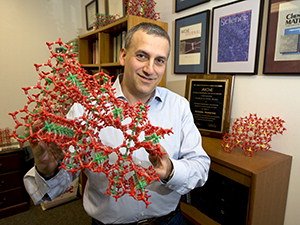Michael Tsapatsis: The Power of Membranes

Usually, problems beget solutions. However, sometimes it happens the other way around—a solution appears, and a suitable problem must be found.
That’s the story of Michael Tsapatsis, chemical engineering and materials science professor, and his ultrathin zeolite membranes.
For more than 10 years, Tsapatsis has been trying to fabricate thin layers of zeolites. Zeolites are crystalline minerals of oxygen and silicon. Some occur naturally. Some not. What makes them special is their regular pattern of molecular-sized pores. They are used in industry as catalysts, filters, and adsorbents.
Tsapatsis was trying to figure out how to reduce zeolite crystals to their minimum thickness. For a long time his attempts came to naught as the fabricated sheets disintegrated.
“Slow progress for some time,” Tsapatsis said. “And then suddenly things worked out.”
In a series of three papers recently published in Science, Tsapatsis and his lab team described how they successfully created “layered nanosheets”— just two nanometers, about 10 silicon atoms, thick. In one project, they grew thin crystals into a “house of cards” that maximized the surface area of the nanosheets.
The zeolite nanosheets were lattices with “pores of molecular dimensions which we can control based on the synthesis method,” Tsapatsis explained. “So that’s the innovation—that we make very thin layers and these layers have holes that are regularly sized and regularly arranged in a crystallographic order.”
Now, Tsapatsis is trying to show what they’re good for.
So far he has demonstrated that the nanosheets make effective sieves, able to separate molecules on the basis of pore size. Such a material has potential applications in the chemical and oil industry. Presently, chemicals such as hydrocarbons in fuels are separated through simple but energy-intensive distillation. Tsapatsis’s nanosheet membrane can separate molecules using far less energy than distillation. “Our membranes are not going to necessarily replace distillation,” he said, “but they are going to be coupled with distillation.”
Tsapatsis has demonstrated good results under ideal conditions, separating simple mixtures in small volumes. For example, his nanosheet membranes separate alcohol and water, a useful function in a biorefinery such as an ethanol plant.
"Our membranes are not going to necessarily replace distillation, but they are going to be coupled with distillation."
— Michael Tsapatsis
Tsapatsis is working with industry to test the nanosheet membranes on complicated mixtures of chemicals with lots of impurities. His lab also just received a federal ARPA-E grant of nearly $2 million to produce his membranes in greater quantities to handle larger volumes.
Meanwhile, the “house of cards” nanosheets appear to have ready application as industrial catalysts to accelerate chemical reactions. Zeolites are already used as industrial catalysts, but reactions proceed slowly as molecules work to the center of the zeolite crystal. By increasing the surface area and exposing the pores to molecules arriving from all directions, Tsapatsis’s house of cards nanosheets promise to work faster and with larger molecules. For example, they turn molecules found in crude oil into gasoline and may be able to boost the efficiency of synthesizing fuels and lower the costs of gasoline and other products.
In early 2012, the University licensed Tsapatsis’s nanosheet technology to startup company Argilex Technologies. Now comes the hard part—convincing investors of the value of zeolite nanosheets. So far, it’s been a tough sell. The applications aren’t necessarily obvious. Nor is the opportunity for a big profit. “Yes, it’s very difficult,” said Tsapatsis. “It is not like a market for a consumer product.”
Meanwhile, the research continues. Tsapatsis is convinced industry will eventually find the value of his zeolite nanosheets. When they do, they will license the technology directly from the University or work through Argilex.
“Argilex increases the options that are available,” he said. “It only increases the flexibility.”
